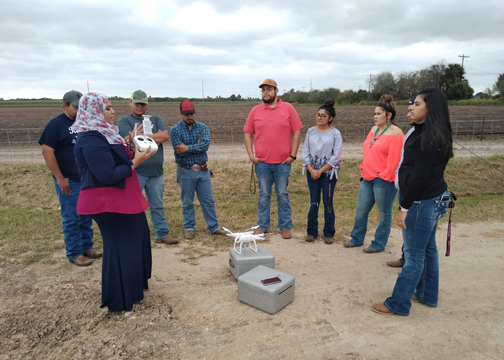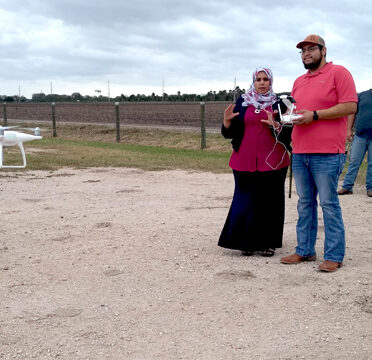(HARLINGEN, Texas) – Drone technology is revolutionizing the field of agriculture, and to ensure that students’ skills meet industry standards, Texas State Technical College’s Agricultural Technology program recently implemented drone training into its curriculum.
“Drones, or unmanned aerial vehicles, are transforming the way work gets done out in the field,” said TSTC Agricultural Technology instructor Sheren Farag. “And it’s important that our students are introduced and trained to this technology because it’s the present and the future.”
When she joined the instructional team in Fall 2018, Farag was able to offer extensive drone-related experience and qualifications that helped the program realize a longtime goal of incorporating the study of drones into its curriculum.
Agricultural Technology department chair and instructor Sammy Gavito said exploring new technological advances used in different phases of agriculture is something he wants his students to be exposed to.
“Technology is constantly evolving, and we need to keep up with it and continue moving forward so that our students remain employable,” said Gavito. “Drones are changing the methods of agriculture operations, and this training will diversify our students’ opportunities.”
Students in the program have access to six industry-standard drones: five DJI Phantom 4 Pros and one multispectral drone.
The drones have already been introduced in several courses, including Crop Science, Horticultural Food Crops, Agricultural Records Management, and Forage and Pasture Management.
Students learn how to manually fly the drones and perform simple equipment maintenance, calibration and camera repairs. They also learn how to use the drone software and phone applications, and how to interpret data and map coordinates.
Two new drone-focused classes will be introduced in coming semesters. Introduction to Geographic Information Systems (GIS) will be available in Fall 2019, followed by GIS Applications in Spring 2020.

The drone training that students receive at TSTC prepares them to obtain a Remote Pilot Certificate through the Federal Aviation Administration after graduation.
“Learning this technology now is essential and crucial to these students’ finding high-paying jobs when they graduate,” said Farag. “This training will open doors for them and make them more marketable in the agriculture field.”
Students are learning that drone technology is an efficient way to improve production in the agriculture industry.
Drones help map and survey land, prepare for future growing and harvest seasons, identity crop issues, manage irrigation, dust and spray crops, and monitor livestock.
Information gathered from done photos and videos can be used to save time and money, and produce higher crop yields.
Wally Santamaria, an Agricultural Technology student who plans to graduate with an associate degree this semester, said he is glad that drone technology was introduced in the program because it has created more opportunities for him.
“Before last semester, I had heard about drones but had never used one before. It’s safe to say it’s been pretty exciting,” said Santamaria. “And with the training I have received, I now have a leg up over other students in other programs who have not received this type of opportunity.”
The 20-year-old added that learning the benefits of using technology in agriculture has changed his perspective.
“Now that I’ve used drones to get research and analysis done, I don’t know if I’ll be able to go back,” he said with a laugh. “This will definitely be beneficial to my future.”
Farag and Gavito agree that studying drone technology makes for well-rounded graduates.
“If our students don’t learn this technology now, they won’t be able to work in the field. This is the future,” said Farag. “This training will allow our graduates to work anywhere.”
For more information on Agricultural Technology, visit tstc.edu.
